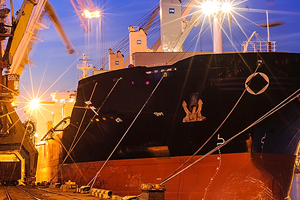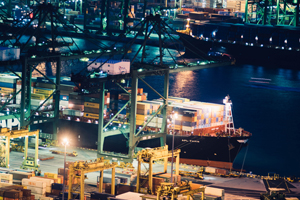Published by WorldCargo News July 6, 2018
Jade Logistics has won a contract to install its Master Terminal TOS at 14 terminals in Indonesia operated by Pelindo I.

The contract is a major win for Jade Logistics, and its first in SE Asia. “PT Pelabuhan Indonesia I (Pelindo I) has selected the terminal operating system (TOS), Master Terminal, from Jade Logistics, to manage their mixed cargo operations at 14 terminals in the provinces of Nanggroe Aceh Darussalam (Aceh), Sumatera Utara (North Sumatra), Riau, and Riau Islands (Kepulauan Riau). Master Terminal will replace Pelindo I’s legacy systems and will help modernize and optimize their terminal operations,” Jade stated.
The roll out will take place in stages over an 18-month period. The first three terminals in the process of implementing Master Terminal are at the ports of Dumai, Sibolga, and Malahayati, and are set to go live by the third quarter of 2018, with the remaining terminals live by mid 2019.
With a large number of multi purpose terminals, Indonesia is a good fit for Jade’s multi-cargo TOS, which will support the 14 different terminals from a single instance of Master Terminal. After Jade Logistics was spun out from Jade Software Corporation (JSC) last year the company, led by CEO David Lindsay, has pursued an aggressive growth strategy that includes pushing into new markets. Before winning this contract it set up an office in Jakarta.
Commenting on winning the contract with Pelindo I, Jade said: “In support of the Indonesian Government’s Maritime port infrastructure upgrade program, dubbed the Indonesian-sea-toll-road program, Pelindo I (one of four Indonesian state-owned port operators) sought an integrated TOS that supported multiple cargo types and facilities to grow alongside the business. Master Terminal was a clear frontrunner, with a proven track record of handling a mixture of break-bulk, bulk, container and Roll-On/Roll-Off (RORO) cargo. Key functionality such as the ability to integrate with the Government Customs system, InaPortNet, and an SAP finance system, were features that won Pelindo I over”.
Pelindo I has a vision is to become the leading Port Business in Indonesia. “Investing in state-of-the- art technology, such as the Master Terminal application, supplemented with improved operational processes, training, and equipment, will ensure Pelindo I is in a position to handle current and future cargo volumes more efficiently and more cost-effectively,” Jade added.
“We are thrilled to partner with Pelindo I on this project,” remarked Lindsay. “The opportunities for them in this region are immense and we’re looking forward to seeing their coastal hubs, industry and economy grow. We’re excited to play a part in Indonesia’s greater expansion plans and seeing what the future holds.”


